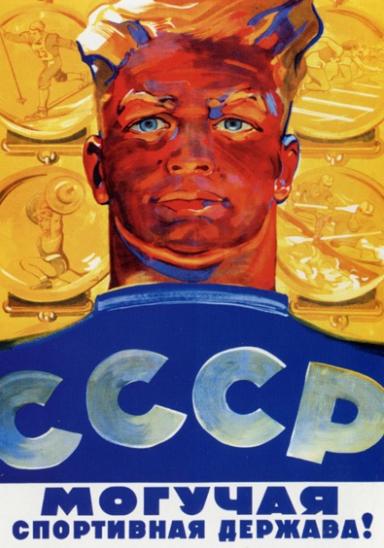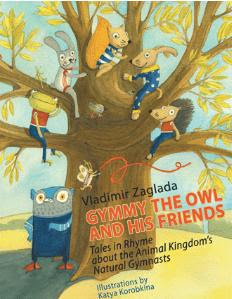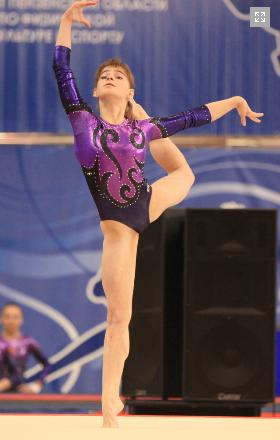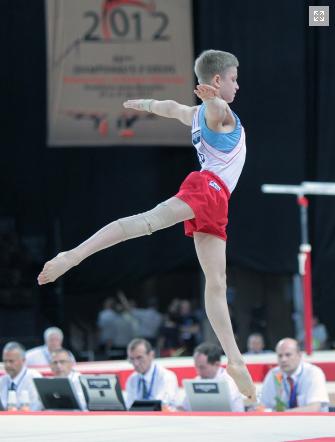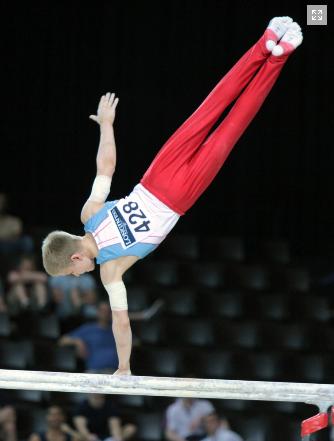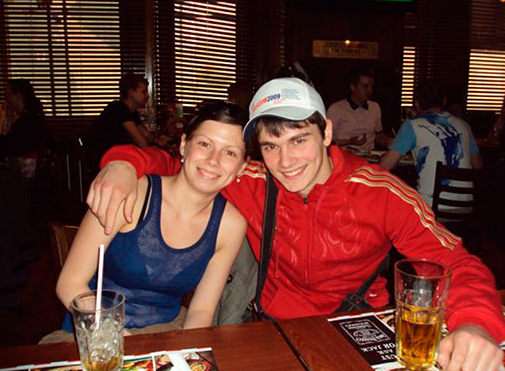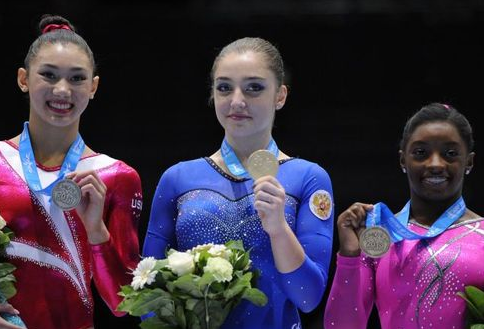![]() |
| State of the art gymnastics facilities at Europa Gym Centre, Crayford |
|
It is 10.30 on a Saturday night, and Len Arnold OBE is shifting mats with the lads. The 58 year old gymnastics coach and social entrepreneur is Head Coach and manager of the Europa Gym Centre in Crayford, an impressive state of the art training facility that opened in 2012 and which today (7th September) hosted the
London Open, a major event in the British gymnastics calendar. This year, the competition acted as a final trial for the British senior men who will travel to Antwerp for the World Championships later this month, and amongst the competition were two youngsters from the historic Nikolai Tolkachev Gymnastics School of the Olympic Reserve, Vladimir, Russia.
The Russian boys' presence was more than a mere opportunity for them to experience competition in a foreign country against some world class rivals. It also marked the 25th anniversary of a partnership between a legendary Russian school that has been a world leader for as long as anyone can remember, and a local gym club that is currently enjoying the unprecedented wave of success in British men's artistic gymnastics. All three of the eventual medal winners in the all around - Max Whitlock, Daniel Purvis and Sam Oldham - had been Olympic medal winners last year in London, and are preparing for similar successes in the forthcoming World Championships.
'In my lifetime, I never thought I would see British Gymnastics win four medals in the Olympics, never thought I would see Britain above Russia in the medals table', says Len, with a twinkle in his eye. 'I cheekily phoned up Vitaly [Director of Vladimir School] after the Olympics and said, would you like me to send an English coach over? ... Vitaly laughed ...'
![]() |
| Artemov and Korolev train together in Vladimir, 1986 |
'Perhaps our coaches gave Britain a boost'25 years ago, when the first exchange programme with Vladimir took place, world gymnastics was dominated by the Soviet Union, and Vladimir was the home of 1988 Olympic all around Champion, Vladimir Artemov. Only two male British gymnasts had qualified to travel to those Games, and they had finished in 81st and 75th position all around. The British team at the 1987 World Championships had come home in 19th position, more than 28 points behind a mighty, victorious Soviet team that had included two Vladimir gymnasts in its ranks, Artemov and 1981 and 1985 World Champion, Yuri Korolev. It is evident that Britain were then by far the junior partners in sporting terms even if the friendship was as warm as it is today.
Today, however, as Len says, Russia and Britain are more closely matched in the battle for gymnastics medals. This spring, for example, in Moscow, Max Whitlock came a close second to Russian David Belyavski in the European Championships all around and Britain matched Russia in the number of medals it won. The style of much of British men's gymnastics too owes quite a bit to the Russian heritage of classical line and technique.
I talked with the Director and Deputy Director of the Vladimir School of Gymnastics, known as 'the two Vitalys', Ivanchuk and Akimov. What do they think that British gymnastics has learned from Russia? How does this kind of partnership help the gymnasts? At first, they were reluctant to answer this directly, more anxious to acknowledge their friends and hosts of the last 25 years than to promote their city's vast sporting heritage. 'We are honoured to be members of this competition, we are very happy to be here. For us it is a great experience as we know that British gymnasts have achieved extremely good results, and our gymnasts learn a lot from your gymnasts', say Vitaly A modestly, before Vitaly I is persuaded to chip in. 'It is a well known fact that Andrei Popov and Sergei Sizhanov, former gymnasts originally from the city of Vladimir, are the main coaches for the British team, Andrei for the senior and Sergei for the junior, and we are very proud of that. Our traditions go back to Nikolai Andrianov, the best gymnast of the 20th century. So our gymnasts accumulated good things from Andrianov, they learned from four-time Olympic champion Artemov and twice World Champion Korolev and perhaps through this they gave British gymnastics a boost.'
Of course the Vladimir School of Gymnastics boasts not only the best gymnast of the 20th century, but also some of the world's leading coaches. The gym's namesake, Nikolai Tolkachev, was one of the trailblazers of Soviet gymnastics coaching for his work with Andrianov, who broke through the downslide in Soviet men's gymnastics fortunes of the late 1960s to take a record breaking 15 medals across three Olympics (1972, 1976 and 1980) including 7 gold. Before his untimely death in 2011 Andrianov was himself a national coach in his home country and in Japan. Yuri Korolev now coaches in Russia's national training centre. And, of course, as mentioned, in Britain we have two more of their gymnastics coaching pedigree, who are together bringing British gymnastics to a fine point and, as Vitaly says, giving it a boost.
But when the two Vitalys speak of how their own gymnasts learn from their rivals in Britain, they are not only expressing pleasant modesty about Russia's - Vladimir's - proud heritage and sporting prowess. They are also expressing a degree of circumspection around the ever shifting power struggles in world gymnastics in which Britain is apparently on the ascendant, while Russia alongside them attempts to re-assert its former dominance. In recent years, Russia and Britain have gone head to head in competition, and it is nip and tuck as to who holds the whip hand in the race for third place in the world behind the brilliance of the 'top' countries, including Japan and China. Germany, Ukraine and the USA would also consider themselves to be in the running. After a few years in the doldrums (no medals in 2004, and a humiliating two bronze medals in the 2008 Olympic Games), Russia is certainly on the rise, but their natural reserve and a degree of reluctance to over-glorify the exploits of the Soviet era perhaps brings with it a certain lack of confidence in putting forward the case for their contribution to world gymnastics.
![]() |
| Nikolai Kuksenkov, a Vladimir gymnast now, on his way to gold in Kazan |
'We are very proud that Kuksenkov chose us'Still, they don't let it hold them back when it comes to competition. In Vladimir, the coaches continue to produce top class gymnasts. Most recently, the club brought forward Yuri Ryazanov, bronze medallist all around at both the 2009 World and European Championships, who so tragically lost his life in a car accident just after winning his world medal. Yuri's personal coach, Igor Kalabushkin, still coaches in Vladimir, where he now takes care of his team's most recent adoption, twice Universiade all around champion (the first time for his home country, Ukraine), Nikolai Kuksenkov. Kuksenkov recently chose to take Russian nationality and to compete for his adopted country. (His home nation's passionate and talented, but impoverished gymnastics programme proved incapable of providing him with the medical care needed to nurse his injuries back to full health. At last summer's Olympics, Kuksenkov was unable to compete all around; this summer, having benefitted from the attentions of specialist doctors under his adopted country's national sports system, he defended his all around title in Kazan.)
Kuksenkov, with his fine lines and rhythm, attention to detail, and quiet determination, is set in the mould of the peerless Artemov, the perfect gymnast to take forward the traditions of his chosen club. 'Nikolai changed citizenship, you know', says Vitaly I, 'he spent a lot of time thinking about which city in Russia he would come to and we are very proud that he decided on Vladimir, because of the traditions of our gymnastics school, and because he feels we have the best coaches. He won three gold medals in the Universiade in Kazan, and we hope that he will perform well at the forthcoming World Championships.'
Looking to the futureCoach Kalabushkin has his hands full these days as he cares not only for the twice Universiade champion, but also for 19 year old Kirill Prokopev, who finished in fifth place at today's competition behind three Olympians and Britain's rising star, Reiss Beckford. Vitaly I, who also coaches Kirill, told me a little bit about the young man, 'Of course we can't say it was his best performance, but still we are satisfied. Kirill pulled himself together, despite the fact that many, many Olympic Games medallists were here. He just showed a good result. Last year he was European Champion on
floor. Now he is 19 and fighting to become a member of the senior national squad.' Kirill certainly showed the lines that one would expect from a gymnast of the Vladimir tradition, and, as a member of Russia's senior reserve, his placing ahead of some of Britain's up and coming gymnasts demonstrates Russia's strength in depth in men's gymnastics. He was accompanied here by 17 year old Ilya Kibartas, whose coaches opted to place him in the Loveday competition for junior men, where he too achieved an impressive 5th place finish, recording the highest score of all competitors on pommel horse but also highlighting on rings and on
high bar. It is clear, therefore, that despite some
disquiet last year that the club had run out of talented gymnasts, there is a future in Vladimir School of Gymnastics that could reap gold in the not too distant future.
Sport ... and friendship But what of the near future? Len Arnold told me his gymnasts were looking forward to a trip to Vladimir in October, the first exchange for two years since Europa Gym has been preoccupied with settling into its fantastic new facilities, and the two Vitalys were obviously excited about this as well, telling me that as the two gyms have a 'long, long relationship, now we are going one step further, we are about to officially make our gyms twin gyms, we will hopefully meet our Mayor and the Governor of Vladimir, and we will sign official documents that will approve the exchange programme between our clubs'.
Speaking to Len and the Vitalys, you quickly recognise that the partnership has gymnastics at its heart, but is about more, showing sport's power to transcend national barriers and promote friendship between people at two distant, very different places. Len remembers the very first exchange. 'It wasn't just a question of taking your best kids,' he says, 'they would accept any kids through the door, and they have a nice, laid back attitude with them, the coaches, everyone. It's a totally different culture to ours - tourists perhaps expect a dour, matter of fact kind of people but I have travelled all around the world and have yet to come across a more generous group of people. I remember one particular time with a good friend of mine, Nikolai. We took the kids to his dacha in the country where we collected wood and made a fire for a barbecue. He said to the kids, 'would you like potatoes?' and gave them all shovels to go and dig them up out of his market garden. It was an amazing experience, especially for some of the kids who thought potatoes came in packets, so it's not just been about gymnastics, it's a whole life experience for everybody who has been. It has become quite a bond.'
That bond of friendship goes back 25 years, and more. Britain's gymnastics links with Russia and the Soviet Union continue to bear fruit in person, but also in the gymnastics arena, where Britain clearly has the greater self confidence now as it reaps the benefits of the Olympic legacy. All around the busy gymnastics arena on the days of the London Open, volunteers and organisers busied themselves, making a thoroughly professional job of staging a competition, something both Vitalys said they would learn from. And Britain's gymnasts, I'm proud to say, looked strong and clean on the apparatus, many of them showing the line, originality and air time so characteristic of the Russian school.
We can expect a fine display in Antwerp, as Russia and Britain make their bids for gold, silver and bronze, and shake hands on the podium.
You can find the full results of the London Open
here.
There is a channel of videos from the competition
here.
Watch Ilya Kibartas on the high bar.
And finally, watch this fascinating
documentary on Nikolai Andrianov, which features a short interview with the founder of Vladimir Gymnastics School, Nikolai Tolkachev.
With many thanks to Catherine Bates and Samantha James, who set up the interview with the two Vitalys for me, to the two Vitalys for being so interesting, and to Len Arnold for being so eloquent.
